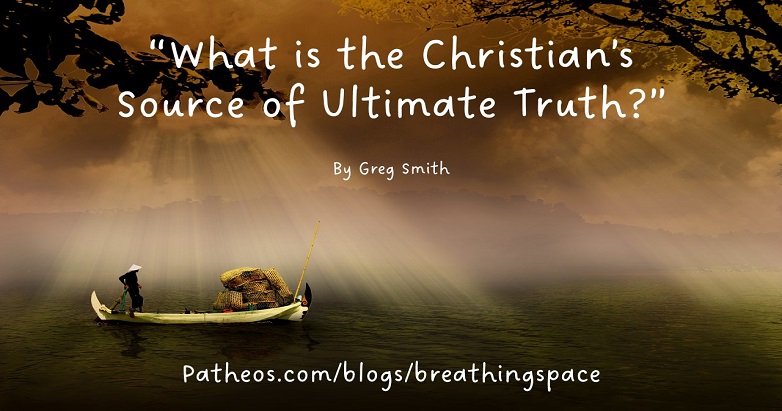Do progressive Christians who no longer believe in an inerrant Bible still have a source of ultimate Truth?

Recently, someone accused me of not having an ultimate source of truth. As a fundamentalist, he believes that the Bible is the Christian’s ultimate source of truth. As such, anything that diverges from the inerrant Word of God that he believes in must be a lie. Because I believe some of the doctrines he derives from a “plain reading of scripture” (eternal conscious torment, penal substitution) are not true, and because I affirm such things as LGBTQ rights, and women’s ordination, for example, he worries that I don’t have a source of ultimate truth. He believes that for progressive Christians, everything is subjective.
I told him that the difference is that he believes ultimate truth comes from the Bible. I, on the other hand, believe it comes from God—and that the Bible is only one vehicle of that ultimate truth. Another difference is that he makes faith and salvation all about having the correct doctrines. For me, there is an ultimate truth. But it’s not about knowing the right facts—it’s about heading in the right direction.
The Source of Truth
Jesus said, “I am the way, the truth, and the life.” If you’re a conservative, you believe that salvation (eternal life) is a matter of subscribing to precise theological statements. If you believe XYZ, then you’re saved. Or, if you just follow these rules (way) your leaders prescribe for you, you can keep God happy. But I’ve come to understand that the way and the life don’t depend on the truth being a set of theological assertions.
Jesus did not come to give us correct theology. Instead, he leads us on a divine river that Jesus both flowed from and tapped into. The Book of Revelation depicts a river of life flowing from the throne of God, bringing healing to all the nations. This is the perfect flow of Creator’s love and grace that gives life to all people because God has no favorites. This river makes us perfect—it does not demand perfection. It guides people into truth, rather than demanding they wrap their brains around and agree with its theology. As the headwaters of the truth, Jesus invites us into the way of life.
Submission to the Truth
Conservatives often talk about “submission to the truth.” But submission misunderstands the river’s flow. Anyone who has floated a river knows that it’s stronger than you are. Currents, tongues, hydraulics, standing waves, and eddies can pull a canoe with a power unmatched by any paddler’s arm. Going with the flow means you learn to paddle with the current, to use the upstream V and downstream V to avoid strainers and log jams. Boaters don’t submit to a river—they know the river, and they trust it.
Evangelicals often associate believing in Jesus with an adherence to theological principles about Jesus. The Greek word pistis is usually translated as belief in English. In Greek, this word has less to do with submission to and agreement with propositions, and more to do with intimate relationship and trust. The canoeist does not submit to the river—she knows it. The boater doesn’t make a science or law of the river—it’s not a matter of believing things about the river but trusting it.
Correcting the Course
Evangelicals insist that truth is found in facts and theological correctness. As a result, they define sin as false belief that will keep them out of heaven, or as disobedient behavior that violates God’s law. Repentance, then, is the correction of wrong ideas that will keep them out of heaven. God will admit them into heaven if they exchange their lies for correct information. This, they say, should come with a rejection of sinful behavior and an adoption of a holy lifestyle. Repentance is about doing a complete 180, rejecting evil and falsehood and submitting to God’s rules. This spiritual worldview is the result of perceiving God as a divine king, lawgiver, professor, or patriarch.
By understanding God as the River of Life, you reject the notion of submission to authority and adopt a “go with the flow” attitude. You understand that the obstacles are not evil—they too are part of the river. But, because running into them could be destructive, you learn how to navigate within the flow, how to use the current and not go against it. It’s not a matter of turning around and going the opposite way, because we’re all flowing downstream together. It’s simply a matter of correcting your course, finding the right channel, and enjoying the ride.
God of the Rule Book
Fundamentalists like to quote Jesus as saying, “I am the way, the truth, and the life. No one comes to the Father, but through me.” Yes, Jesus said this. But conservatives misunderstand what he meant when they quote it. By this, they mean that the only way to enter the pearly gates after death and spend eternity with God is to receive Jesus as their Savior. For them, this means ascribing to certain theological principles:
- That Jesus is the only Son of God;
- That he died on the cross to appease an angry or offended God;
- That unless they believe this doctrine, they are doomed to hell by a system created by this supposedly loving God;
- But that if they ascribe to proper theology and follow certain rules, they can escape eternal conscious torment and live forever with the God who threatened that same unending torture. (Who would want to live with such a God anyway?).
Fundamentalist Christians worship the “God of the rule book.” For them, Truth is all about knowing the right things about the right God, and then doing the right things to make that God happy. Truth, they say, must be objectively only one thing. Anything that deviates from their worldview, then, becomes a falsehood, a lie of the devil. Spiritually, it’s something to preach against. Politically, it’s something to legislate against. The ultimate result of this approach is that what is “true” to one person causes harm to another.
When “Truth” Causes Harm
If religion is all about rules and objective Truth, then I’m going to end up trying to impose my view on others. When I do this, I bring harm to the very people I’m trying to help. I insist that they follow my interpretation. If they don’t, I deny them the same rights, privileges, and equalities I would give to others. I legislate my morality on Capitol Hill, and I demand that others follow my example at church.
But Jesus said, “You will know a tree by its fruit.” If I continue in elitist, prideful, and manipulative attitudes toward the truth, this will only result in the fruit of harm to others. This course that I think is “truth” becomes something no longer worth maintaining. I must adjust my course by what I’ve learned. It must be modified so that I no longer cause harm but bring blessing to others instead. If my insistence on “Truth” causes harm to others, I must reexamine it, and change my direction.
Spiritual Humility
Spiritual humility would suggest a different approach. Of course, Jesus said he was the Way, Truth, and Life. But when he said this, he didn’t mean that only a small group of people on the planet is right, and that ultimate Truth is elusive and damning to the rest of them. Jesus taught a way of spiritual humility. Spiritual humility means being open to the idea that Christians are not arbiters of the only objective Truth that saves. Jesus meant that the only way to get to the ocean is by floating down the river. Not by fruitlessly trying to paddle upstream, as fundamentalists say “sinners” do. Neither by treading water and making God into a theology to be understood, and salvation a series of propositions to be believed.
In the end, there is ultimate Truth. That is not found in an inerrant Bible. That is found in the Divine Ocean—the Source of All. Spiritual humility understands that we’re not there yet—we’re still paddling down the river. We can imagine what the Ocean is like because we’ve seen the river. But we also must realize that the river is only a representation of the ocean. The River of Life is the way by which we flow to God. As a universalist, I believe we will all get there–but none of us can claim to have arrived yet.












